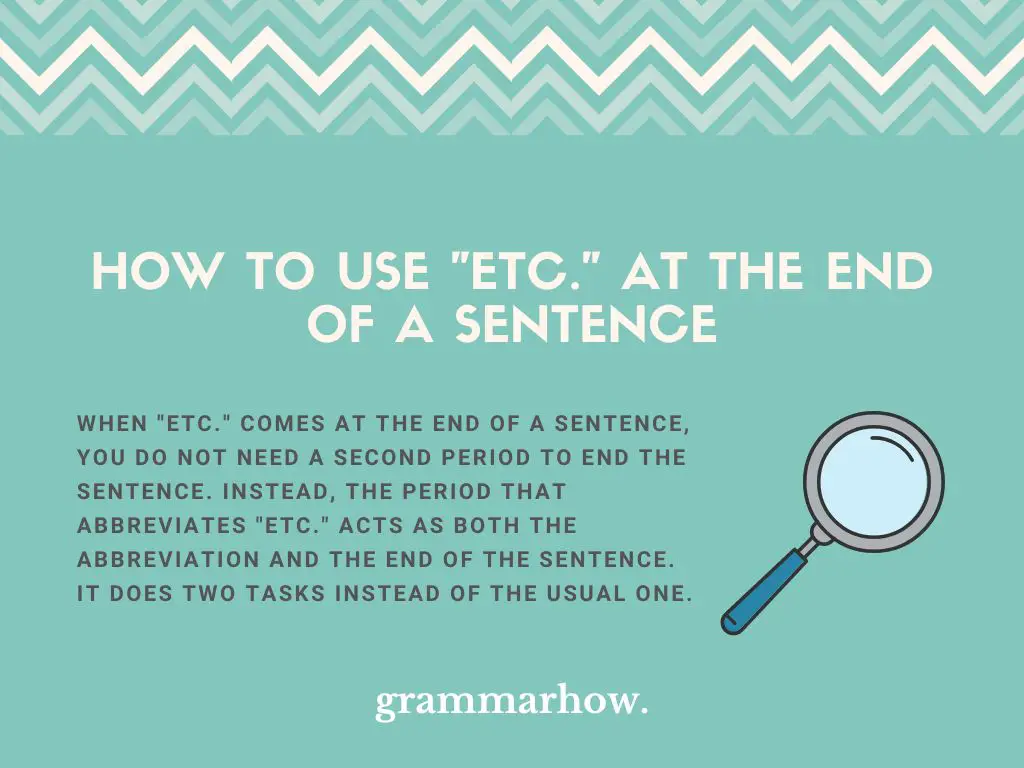Abbreviations have particular rules associated with them, and it’s good to learn what those rules are. This article will explain all you need to know about using “etc.” at the end of a sentence. We’ll help you understand how to punctuate it as well.
How to Use “Etc.” at the End of a Sentence
When “etc.” comes at the end of a sentence, you do not need a second period to end the sentence. Instead, the period that abbreviates “etc.” acts as both the abbreviation and the end of the sentence. It does two tasks instead of the usual one.

This is a fairly common grammar rule that most writers follow. It works well because it means that you never have to double up on a period at the end of a sentence.
- Correct: I like apples, pears, cucumbers, etc.
- Incorrect: You should discuss the birds, bees, etc..
The double period in the second example is incorrect. It looks like a typo (because it is one), and most people will wonder why you chose to use it in that way.
“Etc.” works as the sentence ender, where the period at the end of the abbreviation does two jobs. It will close the abbreviation and close the sentence.
Using “Etc.” With a Period at the End of a Sentence
It would help to know how the period looks in a few more sentences. These examples should clear everything up:
- I’m going to need the books, tables, chairs, etc. We need to make sure everything is set up and ready to go.
- What about the times, dates, etc. Is there anything else that needs to be sorted out before we pack up and leave?
- I could do it on Tuesday if you can. I’ve sorted the venue, the music, the schedule, etc. What else is there?
- I’m not sure about a few of the things you’ve included on this list. For example, apples, oranges, potatoes, etc.
When “etc.” comes at the end of a sentence, the period in the abbreviation works as the sentence ender. You can use it just like you would a normal period without having to double up on one.
Using “Etc.” With Other Punctuation at the End of a Sentence
You can leave periods out of the equation when you write “etc.” at the end of a sentence. However, other punctuation marks still need to be included, even if that means that “etc.” has an extra mark after it.
If you use a question mark, exclamation mark, comma, or any other form of punctuation, you must include it after the period in “etc.” When you end a sentence with a question or exclamation, it’s important to include it after “etc.” to show that the sentence has ended.
- Can we talk about the music, the band, etc.? I want to know about a few things, and I think you can help me.
- You should have told her about all of those things. Why did you hide the secrets, lies, cheats, etc.?
- We could have done so much! Think about all the adventures, fun, parties, etc.! I thought you were cool!
- Can we make it work with the music, the band, the venue, etc.? It will have to go perfectly for the happy couple.
Using “Etc.” Inside a Parentheses at the End of a Sentence
When “etc.” is inside parentheses at the end of a sentence, you do not need to include a period after the closing parenthesis. Instead, you can leave the period inside the parentheses after “etc” and start a new sentence once you’ve closed it.
- I’m going to talk to her about a few things (issues, dramas, etc.) I think it’s important to talk about them.
- She mentioned that there were some issues (like the music, the guests, the cake, etc.) I’ll see what I can do.
- We wanted to discuss the formalities (who, what, where, etc.) We didn’t realize there was so much to say.
- I couldn’t understand the way she said those things (about Matt, Parker, Jake, etc.)
Final Thoughts
You never need to double up your use of a period. If you end a sentence with “etc.,” but you cannot place a period after it. The period in the abbreviation already acts as the sentence ender. You do need to include other punctuation marks (like question marks), though.
You may also like:
9 Better Ways to Say “Etc.” in Formal Writing (Essays)
Etcetera or Et cetera? Here’s the correct spelling (+10 EXAMPLES)
